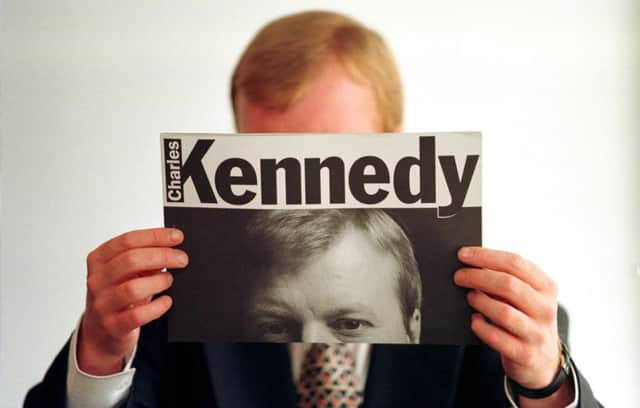Tavish Scott: Kennedy a man never underestimated


I phoned Charles after Christmas in 1999. Would he come up to Shetland to speak at my constituency dinner before the Scottish elections? “Yes of course Tav,” he chortled. I arranged the usual politicians’ photocall. We visited a salmon farm the morning afterwards. Jim Wallace, Charles and I had gossiped into the small hours after the dinner. So a blast of Shetland air on the open deck of a salmon boat was just what we needed. The salmon farmer talked fish farming, Shetland and then politics. Charles was in his element. The witty aside, a trenchant observation and a wonderful put down of some preposterous political position taken by another party. It was a memorable weekend.
Charles argued that politicians had to put people first. If necessary that meant putting his constituents before the party. But when he led the Liberal Democrats, he put the country first. He was right on the Iraq war. The British Establishment, epitomised by a House of Commons led by Tony Blair with the Tories in full support, wanted the conflict. Charles argued, with patience, determination and logic, that the case had not been made. His warnings were prescient. I never thought Charles lacked the mental toughness of leadership. His decision in opposing the Iraq war demonstrated that.
Advertisement
Hide AdAdvertisement
Hide AdSo too on Europe. He worked with people from across politics to argue for the euro. Chancellor Gordon Brown’s five economic tests were nothing of the kind, he observed. They were political benchmarks based on the ongoing civil war over the premiership. Whether the UK’s entry into the euro at that time was right or wrong, Charles argued for it based on principle. He was the most committed of Europeans. Russell Johnston was an inspiration on Europe, as was Roy Jenkins. That grand old man of British and European politics, who had left Labour to create the SDP, was a huge influence. Charles would have been central to the UK staying in the EU and his reasonable and constructive voice would have made that case.
But above all these great political callings came the lilt of the west Highlands. At his great friend John Farquhar Munro’s funeral last year, Charles gazed across the graveyard on a sombre but bright Highland day. The Five Sisters of Kintail bore down. The lap of Loch Duich could be heard on the foreshore. A piper played a Gaelic lament. It was as atmospheric a moment as I have ever witnessed. Charles was visibly moved. Yet he had cheerful words for all who spoke to him that day. He had Celia Munro laughing with a story of JF’s exploits on the Highland Council. JF had been nothing but a pain in the previous Scottish elections. But as we stood in the graveyard, Charles told me that being present was the right thing to do. You do not desert years of friendship because of politics. Friendships endure in life and through death.
I visited Lochaber High School with him during that election campaign. We listened while the shinty coach talked of the success of the school team, coaching and the need for better facilities. I asked Charles if he had been a shinty player at Lochaber High. The eyebrows rose and a smile appeared. What do you think Tav? He loved shinty… from the sidelines. He was a pillar of that most Highland of establishments, the Camanachd Association. The gathering of the clans was his description of cup final day at the Bught in Inverness.
Before my own election, I held the exalted position of Jim Wallace’s parliamentary bag carrier in the late 1980s. One of the Wallace researcher’s jobs was to organise a Highland tour for the Liberal/Alliance MPs who covered all points between Campbeltown and Saxavord in Unst. On one such occasion the MPs joined a demonstration with students at Inverness College. Ray Michie, Bob Maclennan, Jim Wallace and Charles spoke and debated with students. Charles had them eating out of his hand. They laughed at his jokes and nodded at his serious observations. We then drove to Portree. The next day, on the three-hour drive back to the Highland capital, Charles gave me a political tour de force on the Highlands, nationalism and Britain. The lessons of that discussion stay with me to this day.
When I became leader of the Scottish Liberal Democrats, he was incredibly helpful. After the 2010 general election, when the Lib Dem MPs decided to form a coalition with the Tories, it was Charles who caught me as the London meeting was breaking up. I despaired at a pact with the Tories. I guessed at the likely political fallout in Scotland. The Nationalists and Labour salivated at the prospect and the rest is now history. Charles spoke against the formation of that coalition. Had his colleagues listened to him, there would be many more Lib Dem MPs still in the House of Commons.
One last thought. Charles phoned during this year’s election campaign. I was chasing the Scottish Government for answers on a Highland issue. Eventually they arrived. I texted to ask how to get the information to him. Give me an hour, came the reply. He was watching the Barcelona match in the Champions League with Donald. His son and family trumped politics.
I struggle with the thought of not having Charles to phone, to laugh with and to analyse the politics of our country.